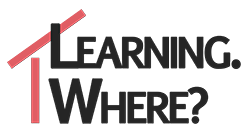12 Music Courses Online (Free)
Affiliate Disclaimer
This post may include affiliate links, meaning we earn a commission when you purchase a course or subscribe to a service using our links. However, all opinions are the author's.
Here are 12 of the best online courses about music on Coursera. They all average over 4.5+ stars in ratings, and most of them include subtitles in multiple languages.
#1 The Importance and Power of Music in our Society
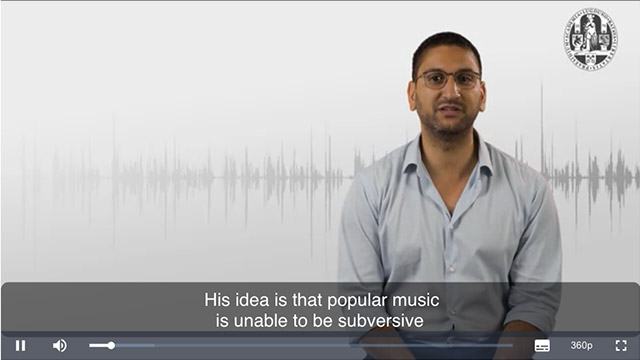
To start with, this course overviews major connections between music and societal concepts. Some ideas explored in the course include “music and personal identity”, “music and the state”, “music and virtue”, the sociological concept of the culture industry as it relates to music, among many others.
The course is described as being beginner level, so you don’t need experience with any of these concepts in order to enroll. It has an average of 4.6 stars, based off 50 user ratings. According to a reviewer:
“A very interesting course that deals with different dimensions of music. It will make you think about how music influences your life and the society where you live in, bringing up interesting questions.” – Rodrigo L.
#2 Music as Biology: What We Like to Hear and Why
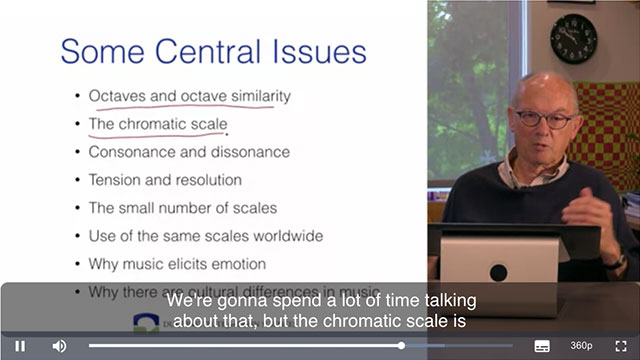
This course looks at music from a different perspective, looking mainly at psychological concepts that attempt to explain the kind of music we as people like. Some of the units include the following:
- Sound Signals, Sound Stimuli, and the Human Auditory System
- The Perception of Sound Stimuli
- Vocalization and Vocal Tones
- Defining Music and Exploring Why We Like It
- Musical Scales
- Music, Emotion, and Cultural Differences
It has an average of 4.3 stars in ratings, and this is what some of the reviewers have said:
“Note: I am coming in from the perspective of a dude wanting to create and compose music. I especially love module Week 6. It gave me a new insight on how to create newer types of sounds (I can’t get enough).” – Vincent A.
“Absolutely loved this course! Would recommend to anyone with a musical background wanting to know a bit more about the origins of music.” – Sharon V.
#3 The Art of Music Production
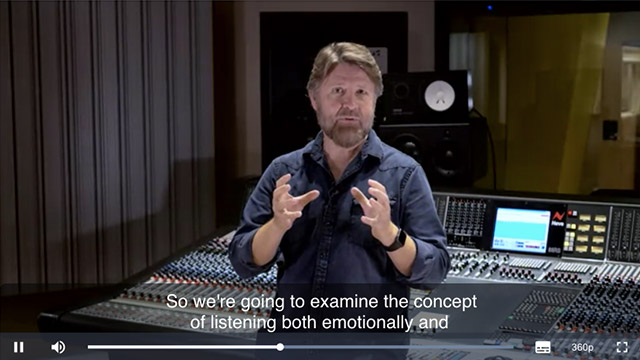
This course is all about music production, and it covers themes ranging from “Listening Emotionally vs. Listening Technically” to “Crafting Better Melodies” and “Microphone Types and Pick Up Patterns”. The overall course is divided into 4 modules, as follows:
- Listening Like A Producer
- Identity, Vision, and Intention
- Strengthening Musical Productions: Tools & Strategies
- Defining the Sonic Signature of your Song
It’s a relatively comprehensive course with over 14 hours of video, and it’s among the best reviewed in Coursera, with 4.8 stars on average. Some reviews include the following:
“I really enjoyed this course. I learned how to create my very first music song all on my own using an interface. I am independent and ready to make lots more music in my home on my own time by myself.” – Rashida M.
“Exceptional and essential guide for music producers. This course really makes you think of music production from a holistic perspective. I’ll never listen to music the same superficial way anymore”. – Luis R.
“Absolutely loved it. As someone who is quite technically minded when it comes to music production, it was refreshing to see it from an artistic point of view”. – Gemma W.
#4 Fundamentals of Music Theory
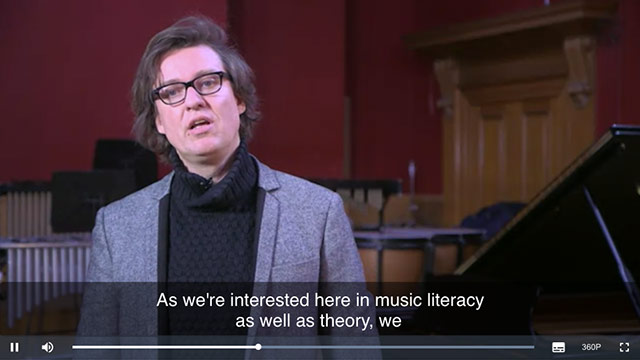
While this course claims to be designed for beginners and experts alike, some reviewers warn that the material is on the more complicated side. Nevertheless, the course has average of 4.5 stars in ratings. It is divided in the following modules:
- Pitches, Scales, Modes and Chords
- Keys, Minor Scales, Intervals and Clefs
- Rhythm and Form
- Harmony 1: Functional Harmony
- Harmony 2: Inversions, Cadences and Sequences
And here are some reviews from students:
“[It’s] not as easy as it seems, it will give you a good challenge. After you finish this, you will be more confident about your music theory.” – Kline T. M.
“Although there is a lot of useful material covered, there was also a lot of hand waving and redirecting [to] wikipedia instead of explaining the material thoroughly in their own words.” – Nix-Nox
The course also counts with subtitles in Spanish, Vietnamese, Arabic, French, Portuguese, Italian, Catalan, German, and Russian.
#5 Understanding the Music Business: What is Music Worth?
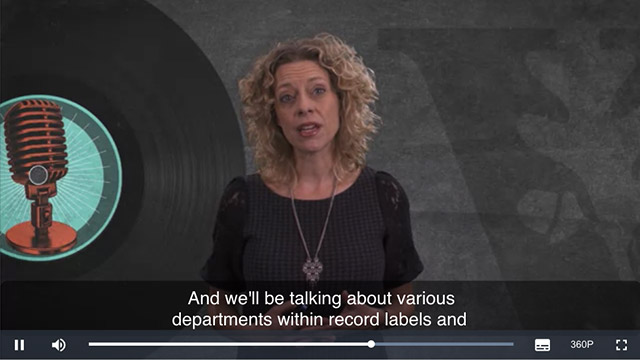
This course is all about the music industry in the U.S., and it covers topics such as copyright and publishing, record labels, and more. It is broken up into the following units:
- Recording & Record Labels, Part 1
- Recording & Record Labels, Part 2
- Copyright & Publishing
- Media
- Live Performance
- New Models, Trends & Strategies
The university that offers the course, Vanderbilt University, is located in Nashville, Tennessee. The course description points out that this location contributes a “unique perspective” to the analyses in the course.
Here is what some of the students are saying:
“I loved all the interviews with industry insiders – they sort of allow you to see the big picture from different angles. All the recommended reading was also pretty useful.” – Natalia F.
“Interesting. Good for beginners but some info is a little bit out of date. Overall, good course.” – Diego F.
#6 Music and Social Action
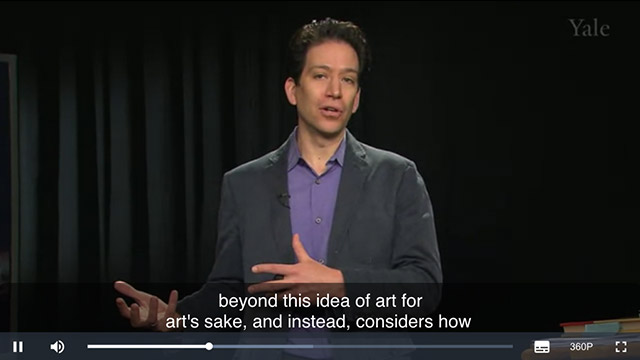
Offered by Yale University, this course explores philosophical ideas as they relate to music and society. There also seems to be a focus on classical music, as pointed out by some reviewers. Additionally, the course counts with subtitles in Spanish, French, Portuguese, and Russian.
Some of the weekly modules include “What is Art and How Do We Experience It?”, “Democracy and the Arts”, “Arts and Urban Renewal, “20th Century Artists and Social Commitment”, “21st Century Artists and Social Commitment”, and “Creating Social Action”.
And here are some opinions by students:
“This course starts from the abstracts of aesthetics and makes its way into the real world applications of art as a tool to further social goals.” – Farid H.
“Very inspirational, in-depth and well built. Highly [recommend]! Being a dancer and choreographer, I could related all material and ideas of the course to my art form (and other art forms too)”. – Marie A.
#7 The Place of Music in 21st Century Education
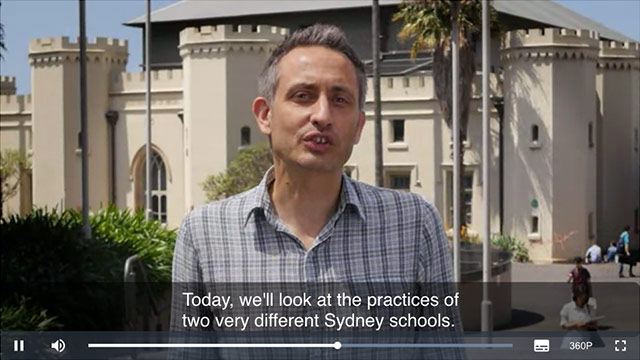
This course examines different approaches for teaching music in the classroom, in addition to considering music, education, and technology more broadly. It features interviews with music educators, and it is divided in the following modules:
- Technology in (music) education
- Aliens (“Why does classroom music seem alien?”)
- Inspiring Research
- The good news
- To infinity and beyond
Here is what some reviewers have said:
“This course makes you think about how to design your own music classes and why. Some very interesting and inspiring ideas are given from different angles.” – Lauri B.
“Anyone teaching music at this time in history can benefit from taking this course.” – Terry O.
#8 The Blues: Understanding and Performing an American Art Form
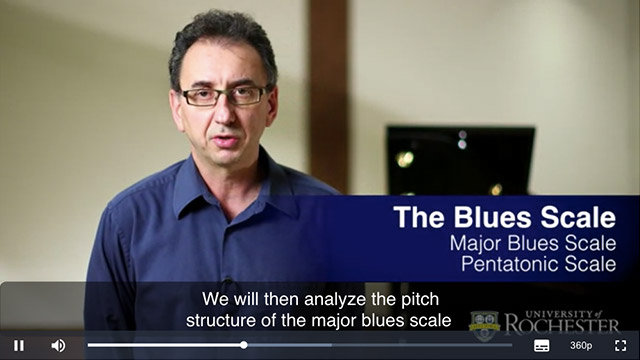
As a whole, rather than diving into the history of blues, this course seems to focus on the more technical aspect of blues as a genre. It has 4.8 stars in average ratings, and it is made up of the following modules:
- Blues Progressions – Theory and Practice
- Blues Scales
- Keyboard Realization
- “Bird” Blues and Other Blues Progressions
- Improvisational Tools
- Improvising the Blues
Many reviewers have commented on the improvisation-centered element of the course:
“An exceptionally good course on jazz theory and improvisation. Don’t let the name mislead you, the blues is used in this course as the basis for form, harmonic and melodic improvisation, but this is a Jazz theory course, not a Blues (in the traditional sense) course.” – Jose D.
“I’ve done quite a few online courses and have been studying Jazz intensively and seriously since 2009. This is, hands down, the best course I’ve found on the subject of improvisation – because it is so carefully organized and well explained.” – Joao P.
#9 How Music Can Change Your Life
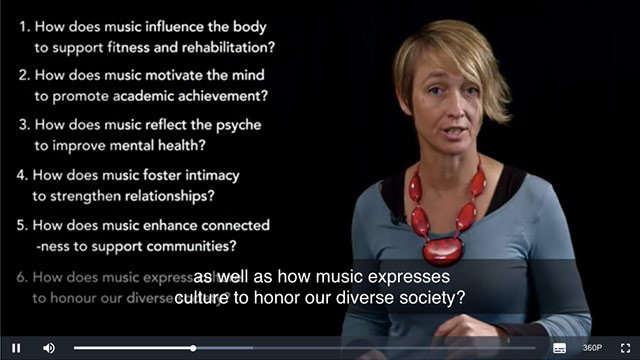
This course is divided into 6 modules, and each of them tackles a specific way in which music interacts with our lives. Some of the themes include fitness and rehabilitation, academic achievement, mental health, cultural expression, and more. The material also explores how music can help strengthen relationships and make communities feel more connected.
The course also features 30-minute podcasts from special guests in each module. Subtitles are available in Spanish, Portuguese, Russian, and French.
And here is what some of the students are saying:
“The course was the perfect way to get introduced to the many ways music therapy can impact our lives. Absolutely inspired.” – Hannah A.
“True to [its] title, the course comprehensively covers all the possible ways music affects us.” – Sanjeevani J.
#10 The Art of Vocal Production
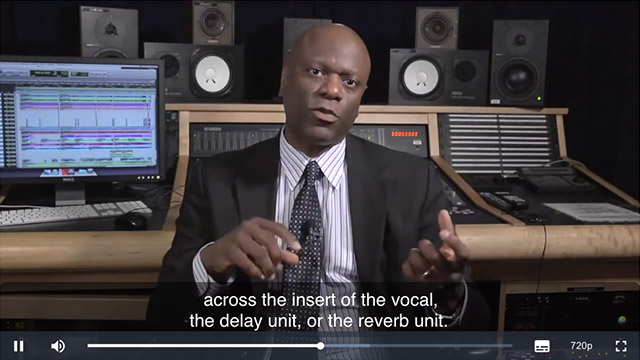
Offered by the Berklee College of Music, this course is on the more technical side, as it focuses on production. It starts out by covering topics like vocal range and vocal registers, and it later goes on to explain the basic tools of a DAW (digital audio workstation). It is divided into the following four modules:
- Natural Vocal Design: How Vocal Producers Create
- Artificial Vocal Design: How Vocal Producers “Sweeten” the Creation
- Vocal Time Compression and Expansion: Tools of the Trade
- Vocal Pitch Correction and Tuning: More tools of the Trade
And here are some reviews by students:
“Very comprehensive course. As a music producer who has no background in vocal production, this really helped me out.” – Vin J. M.
“The entire course is amazing but what stood out to me is the concept of panning vocals. I think I watched those ones over and over”. – Erick M.
#11 Introduction to Classical Music
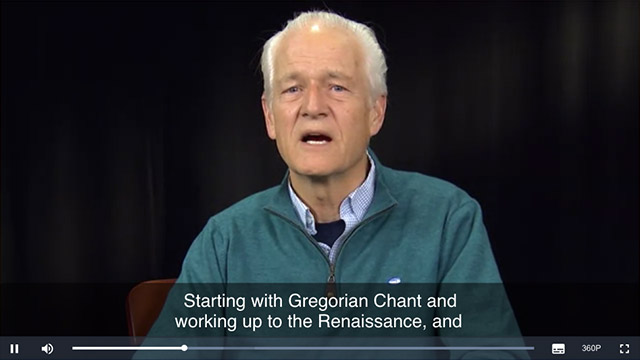
With over 24 hours worth of videos, this is a very comprehensive course by Yale University. It begins by diving into the basic components of music, and later proceeds to analyze specific compositions and their historical context.
Some of the units include “What Is Music?”, “The Sound of Music”, “Music Back in the Day”, “The Baroque Era”, “The Classical Era”, and more. The course also offers subtitles in Spanish, Croatian, Arabic, Portuguese, Chinese (Simplified), Vietnamese, and more.
This is what some reviewers have said:
“This course was an absolute joy, and I was always in a good mood after the lectures”. – Lori G.
“I feel that I learned the most important basics of listening to music. I feel more qualified to differentiate between musical genres and have a conversation about musical terms.” – Carol L.
#12 Approaching Music Theory: Melodic Forms and Simple Harmony
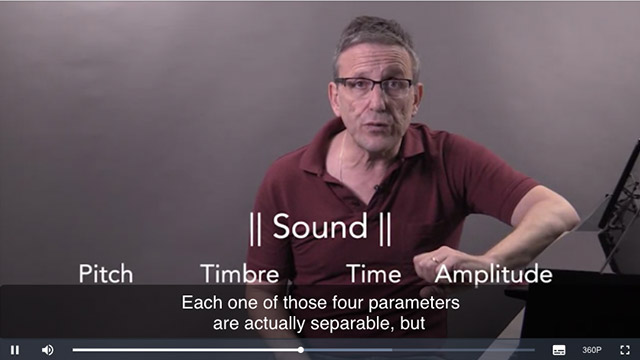
This course, offered by the California Institute of the Arts, is described as “intermediate-level”. Some of the styles explored by the course include “classical, modern, ancient, pop, jazz, and folk”. And rather than focusing solely on theory, the course description claims that students get to learn music history too, and they get to write their own music.
It is divided into the following modules:
- Melodic Structures: Lines, Shapes, and Simple Modes
- Melodic Structures: Simplicity, Repetition, and Change
- Combining Pitches: Consonance and Dissonance
- Cadences and Basic Harmonic Function
Many of the reviews note that the course is somewhat different from other theory courses:
“Completely different approach of teaching music theory. Even if you already studied music theory it is worth to take this course.” – P. J.
“Great survey of Western music. I found it more of an appreciation of listening to music rather than a formal music theory course.” – Angelina W.
Do any of these music courses pique your interest? Are there any music courses you would recommend? Let us know!
And check out a similar version of this post in Spanish.
